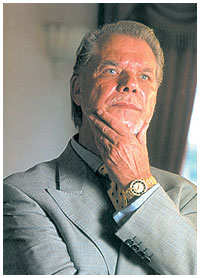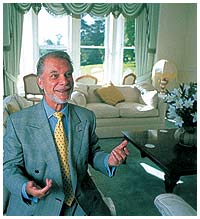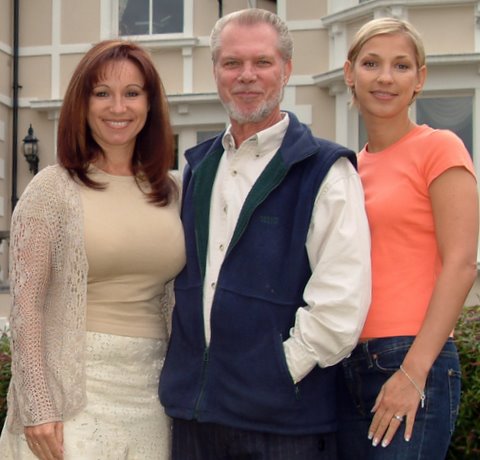 I’ve always wanted to own a football club,- confessed David Gold. “I’m a frustrated player, because I missed out as a young man. I lived across the road from West Ham and with a bit of luck I would have been a professional footballer.” David and his brother later bought shares in West Ham. but couldn’t get enough to secure control. “You have to have control,” he said. “A small investment in a football club is no good. You have to be a principal shareholder so you can dictate policy.”
I’ve always wanted to own a football club,- confessed David Gold. “I’m a frustrated player, because I missed out as a young man. I lived across the road from West Ham and with a bit of luck I would have been a professional footballer.” David and his brother later bought shares in West Ham. but couldn’t get enough to secure control. “You have to have control,” he said. “A small investment in a football club is no good. You have to be a principal shareholder so you can dictate policy.”
 Birmingham City was in serious decline when the Golds came along with their friend, David Sullivan, in 1993. “It was minutes away from becoming a supermarket.” So how does football compare to any other business? In David Gold’s view. it doesn’t. “Football is the one business where you don’t set out to make money.” he said. “It’s all about generating money from other areas to fund it. because the only potential profit in a football club is eventually selling it. It’s almost like a pension fund. One day when I’m ready to retire [around 95, he chuckles] I might consider selling my shares and hopefully there’ll be a passionate multi-millionaire in Birmingham.”
Birmingham City was in serious decline when the Golds came along with their friend, David Sullivan, in 1993. “It was minutes away from becoming a supermarket.” So how does football compare to any other business? In David Gold’s view. it doesn’t. “Football is the one business where you don’t set out to make money.” he said. “It’s all about generating money from other areas to fund it. because the only potential profit in a football club is eventually selling it. It’s almost like a pension fund. One day when I’m ready to retire [around 95, he chuckles] I might consider selling my shares and hopefully there’ll be a passionate multi-millionaire in Birmingham.”
Football has a magnetism about it that can turn a sane and sober man into an addict. Anyone who has ever read Nick Hornby’s Fever Pitch will know what I mean. Did this happen to Gold? Of course it did, and it didn’t take long. “I thought I would be a West Ham fan all my life.” he admitted. “But as the first year progressed at Birmingham I realised I’d been infected by this virus with no known antidote, called ‘fanhood’. But when you get into the boardroom it’s absolutely vital that you return to being a businessman.”
David Gold grew up in poverty in the East Find of London during World War Two. He failed his 11-plus (‘miserably’), having had his education interrupted by dysentery. TB. a bombed out school, then evacuation to Doncastor.
“I have a driving requirement for success and more success”
This background has left its legacy. “When I first saw, 30 years ago. that I had a million pounds in the bank. I thought. ‘I’m there. I’m a millionaire’. That Feeling lasted about five’ minutes, because I wanted more. I have a driving requirement for success and more success. Even with a million pounds in the bank – which is a momentous moment in anyone’s life I can assure you – there’s always the fear that it can be snatched away, especially if you’re self-made, and have come from the bottom rung of the ladder.
 Looking back on a business career with many highlights. I wondered if there was one achievement of which David was particularly proud. It’s a question he has often thought about, he admits, and it always takes him back to the early days. “It’s probably being a 21 year old bricklayer, selling my motorbike, raising some money with my brother and running a bookshop. It was a little science fiction bookshop in Charing Cross and it was the beginning of everything for me. There I am in January in the freezing weather, a bricklayer. In February I’m in a shop embarking on a fascinating adventure and at the end of three years I had more money than I could ever imagine. It was a combination of long hours, hard work and luck.
Looking back on a business career with many highlights. I wondered if there was one achievement of which David was particularly proud. It’s a question he has often thought about, he admits, and it always takes him back to the early days. “It’s probably being a 21 year old bricklayer, selling my motorbike, raising some money with my brother and running a bookshop. It was a little science fiction bookshop in Charing Cross and it was the beginning of everything for me. There I am in January in the freezing weather, a bricklayer. In February I’m in a shop embarking on a fascinating adventure and at the end of three years I had more money than I could ever imagine. It was a combination of long hours, hard work and luck.
“…at the end of three years I had more money than I could ever imagine”
“I remember going to see a bank manager for the first time in my life.” he continued. “Nobody had ever called me ‘Mr Gold’ in my entire life, he was using words like ‘ramification’. I thought Ramification was an Indian cricketer. But talking about luck, he gave me enough money to keep the store running for six months.” Gold has done momentous deals since then, of course, but this was the one that got him started and is memorable for that. He loves his football analogies and he had one waiting to round this story off. “You can be a talented player, but unless you’re on the pitch, you’re not going to score a goal. That’s what the shop was for me. It got me on the pitch.”
Once on the pitch, you could say that he trained hard and played hard. The first thing he had to do was educate himself. Meeting the bank manager had shown him that there was an enormous gulf to be bridged between where he was and where he wanted to be; between who he was and who he would have to deal with to got there.
The bank manager kept saying,”Im sorry, can you say that again”, he really couldn’t understand what I was saying, so I realised that that had to change. And I had to learn what ramification meant.”
So he went into business at 21. with no experience and no education. How did he acquire his business acumen? “I think it was inherent.” he said at once, referring to his mother. His father was largely absent from his childhood, his major contribution being to prevent him from becoming a footballer. But his mother was a big influence. Before Christmas they would make garlands as a family team. They converted the front room into a shop and the children would take turns on the stall. “That was entrepreneurial and we survived.” he said. It obviously taught him the value of hard work, but he also acknowledges the role that luck played in it.
The family had to move when their house was bombed and were fortunate to move to the High Street “If we’d gone to a back street we’d have had no customers.” he pointed out. “Later, when I was in the shop. I felt that I knew what I was doing, because of this experience. Hard work and long hours were things I’d inherited from my mother. And I learned more in my three years in the shop than you would in a lifetime of business studies.”
 Luck was also to play a crucial role some years later. “I bought two stores in Tottenham Court Road for £40,000 in 1970,” Gold remembers, “and ten years later we were offered £2 million for them for redevelopment. That’s pretty good luck.” But David used his business skill to make the most of the opportunity. He wasn’t prepared to sell the properties for £2 million. “We said we wanted £3 million.” he said. “The chief negotiator thought it was outrageous and said he would never pay £3 million. He didn’t. 18 months later he paid £2 million nine hundred and ninety nine thousand and ninety nine pence. I can see him to this day. So it was a combination of good fortune and knowing that our two stores were the key to the project. It was a momentous deal.”
Luck was also to play a crucial role some years later. “I bought two stores in Tottenham Court Road for £40,000 in 1970,” Gold remembers, “and ten years later we were offered £2 million for them for redevelopment. That’s pretty good luck.” But David used his business skill to make the most of the opportunity. He wasn’t prepared to sell the properties for £2 million. “We said we wanted £3 million.” he said. “The chief negotiator thought it was outrageous and said he would never pay £3 million. He didn’t. 18 months later he paid £2 million nine hundred and ninety nine thousand and ninety nine pence. I can see him to this day. So it was a combination of good fortune and knowing that our two stores were the key to the project. It was a momentous deal.”
What was the biggest risk that David has taken, there was no hesitation in the reply. “When I invested half a million pounds in Sport Newspapers in 1986. with a further half a million as a back up. No newspaper had been launched for years, let alone the cult thing that we were going to do. You’d just got one page three girl in The Sun and we were going to put in ten page three girls, plus we were going to be zany. We knew it was a risk but we could equally see its potential. Sport Newspapers made £9 million in 2004. You take a risk and that one came off.” I noticed that my research material made; a big splash about David Gold being 82nd in the rich list, with £370 million. Some people; might be embarrassed by that, or shrug it off as unimportant. How does David feel about it? We haven’t mentioned football for a few minutes, but it comes up again in his answer. “I’m a great believer in league tables and at seven years old the first thing I wanted to do on a Sunday morning was get the paper and see where my team was in the table. I think league tables play an important part in our lives. It’s a barometer of my success. 1 think it’s a great deal of fun and I must confess I actually enjoy it. I can’t wait to see how we’re doing.”
 Is there ever going to come a point when he might say that’s enough, or will he always want to be climbing the table? “I want success for everyone around me,” he says. “I’ve got some great people working for me and I want them to move forward. It’s a family business, too. and I want it to expand for them.” His daughter Jacqueline Gold is chief executive of Ann Summers and Vanessa is director. The more the business grows, though, the more he must rely on other people. Will this be a problem for a family business? “1 think the most difficult thing to do in business is to ensure; that you choose the right person for the job. Their personality and the chemistry between them and yourself is a key issue.”
Is there ever going to come a point when he might say that’s enough, or will he always want to be climbing the table? “I want success for everyone around me,” he says. “I’ve got some great people working for me and I want them to move forward. It’s a family business, too. and I want it to expand for them.” His daughter Jacqueline Gold is chief executive of Ann Summers and Vanessa is director. The more the business grows, though, the more he must rely on other people. Will this be a problem for a family business? “1 think the most difficult thing to do in business is to ensure; that you choose the right person for the job. Their personality and the chemistry between them and yourself is a key issue.”
As David had mentioned expansion, I wondered what his plans were. What targets does he still have? “We have 135 Ann Summers retail stores at the moment,” he replied, “which have taken 20 years to amass. This coming financial year we will add 20 more. Our projected target for the UK is 200 stores. We’ve got more; targets now than I’ve; ever had in my entire life.” he went on. “I’m just waiting for our new planes.” But for the moment, he’s putting his energy into Birmingham City, determined to achieve promotion.
